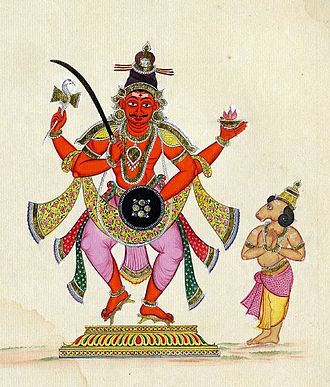Daksha
Daksha is a Sanskrit word said to be a Prajapati (in-charge of creation) and one of the Brahma's sons. The equivalent meaning in English is Competent.
With his wife Prasuti, he is the father of fifty daughters, 27 of whom, representing the 27 Nakshatras, were married to Soma or Chandra. Daksha found that Soma overly favored one daughter (Rohini) over the others, thus neglecting their needs and flouting his responsibilities. For this, Daksha cursed him to wither and die. The daughters intervened and made his death periodic, symbolized by the waxing and waning of the moon.
According to Padma Purana (Srishti Khanda, Chapter 6):
Daksha begot 60 daughters on Virini. Of the 60, he gave 10 in marriage to Dharma, 13 to Kashyapa, 27 to Soma, 4 to Arishtanemi, two to Shukra, two to Krishashva, and two to Angirasa.
Arundhati, Vasu, Jami, Lamba, Bhanu, Marutvati, Sankalpa, Muhurta, Sadhya, Vishva are the wives of Dharma. Vishva gave birth to Vishve Devas and Sadhya to Sadhyas. Marutvantas were born to Marutvati, Vasus to Vasu, Bhanus to Bhanu, Muhurtajas to Muhurta, Goshas to Lamba, Nagavidhi to Jami, Prithvitalas to Jami, and Sankalpas to Sankalpa.
Aditi, Diti, Danu, Arishte, Surasa, Surabhi, Vinata, Tamra, Krodhavasha, Ire, Kadru, Shukri and Shuni are Daksha's daughters who were married to Kashyapa. Aditi's sons were Adityas, Ditis sons were Daitya and 48 Maruttas, Danu's sons were Danavas, Vinata's sons were Garuda and Aruna, Kadru sons were the powerful Nagas. Tamra gave birth to six daughters (Shuki, Shyeni, Bhasi, Sugrudhri, Gridrika, Shuchi). Surasa's children were Sarpas. Krodhavasha gave birth to the Rakshasa group called Sunamas. Surabhi gave birth to cows and buffaloes. Muni gave birth to Munis, Apsaras, Kinnaras and Gandharvas. Ira gave birth to plants. These were the creations in Swarochisha Manvantara.
One of the daughters of Prajapati (often said to be the youngest) was Sati or Dakshayani, who had always wished to marry Shiva. Daksha forbade it, but she disobeyed him and did so anyway, finding in Shiva a doting and loving husband. Daksha disliked Shiva intensely, calling him a dirty, roaming ascetic and reviling the great yogi's cohort of goblins and ghouls. From then on, he distanced himself from his daughter, Dakshayani/Sati, and his son-in-law, Shiva. This enmity culminated in a great sacrifice he had been hosting, one to which he invited all and sundry, family and allies, gods and rishis, courtiers and subjects. Consciously excluding Sati from the list, he also set up a statue of Shiva, which he defiled and mocked, at the entrance to his hall. Sati, ebullient at the thought of such a great event, and assuming that the daughter of the king was welcome no matter what, attended the festival. Snubbed by her father and treated with disdain, Sati nonetheless maintained her composure. Indeed, even her father's refusal to invite Shiva, her husband and thus a traditionally honored member of any Hindu family, was to some extent borne. However, on seeing the shameless insult to her husband in his absence, and the repeated slights King Daksha and his courtiers railed at Shiva, she committed suicide in grief for her beloved. Hearing the news, Shiva's attendants rushed inside the ceremony hall and started attacking all the guests present there, however, the demons invoked by Bhrigu defeated Shivas attendants and they retreated back to his abode. Upon hearing the news of his beloved wife's death, Shiva was furious that Daksha could so callously cause the harm of his (Daksha's) own daughter in so ignoble a manner. Shiva grabbed a lock of his matted hair and dashed it to the ground. From the two pieces rose the ferocious Virabhadra and the terrible Rudrakali, while Bhadrakali arose from the wrath of Devi herself. Upon Shiva's orders they stormed the ceremony and killed Daksha as well as many of the guests. Terrified and with remorse the others propitiated Lord Shiva and begged his mercy to restore Daksha's life and to allow the sacrifice to be completed. Shiva, the all-merciful One, restored Daksha's life, with the head of a goat. In his humility, and repentance for his graceless and sinful acts, Daksha became one of Shiva's most devoted, attendants.
Sati/Dakshayani later incarnated as Parvati in her next life, and remarried Shiva, henceforth never to part with him again. It is for this reason that Shiva, while monogamous, has had two wives in reality, but the same soul in two incarnations.
A place that claims to be the site of Daksha's Yagna is Shri Daksheshwar Temple, about 4 KM from Haridwar. There is a pit within the grounds of the temple which supposedly marks the exact location of the sacrificial fire.
